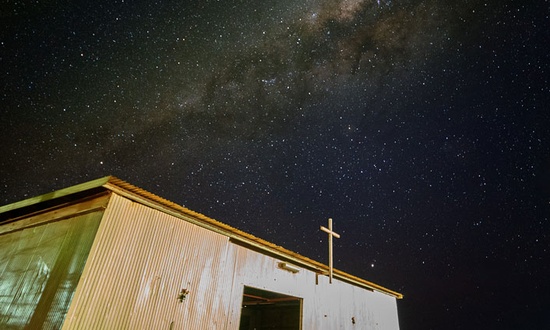Як саме має впливати розуміння Небес на наше життя у даний момент? Чому, на вашу думку, багато християн більше не чекає того, щоб попасти на Небеса? Які найбільш хибні уявлення існують про Небеса?
Християни, які стикаються з небезпекою смерті, часто відчувають, що зарано покидають життя, ніби найкраще все ще попереду. Вони розчаровані, думають про всіх людей і речі, за якими сумуватимуть, коли підуть з життя.
Однак Божих дітей найкраще чекає саме попереду – уявіть собі Батька, Який влаштовує гостину, щоб відсвяткувати повернення свого блудного сина додому (Луки 15). Ця гостина вже почалася в нашому справжньому домі, де ми ще не були, і саме туди ми потрапимо після смерті. Нас зустрінуть там з радістю, як і ми одного дня також зустрінемо тих, хто попаде на Небеса пізніше.
Бог наказує нам у Своєму Слові налаштувати свій розум на Небеса, де є Христос (Колосян 3:1). Ми зосереджуємось на реальному місці, де живе вічно втілений, воскреслий Христос. Написано, що ми «чекаємо нових небес і нової землі, в яких проживає праведність» (2 Петра 3:13) – відновлений всесвіт, наше майбутнє і вічний дім.
Павло пише: «Бо я вважаю, що страждання теперішнього часу нічого не варті порівняно з майбутньою славою, яка має з’явитися нам» (Римлян 8:18). Якщо ми не розуміємо майбутньої слави Небес, які чекають на нас, ми не збагнемо, що наші нинішні страждання є набагато меншими в порівнянні з небесною величчю.
Бог вклав в наші серця ті самі бажання, які Він обіцяє тим, хто йде за Ісусом Христом: воскресле життя у воскреслому тілі з воскреслим Христом на воскреслій землі. Наші бажання точно відповідають Божим планам. Це не той випадок, коли ми приймаємо бажане за дійсне. Навпаки — ми хочемо, щоб справжнє життя відбувалося фізично, тому що Бог створив нас таким чином і з самого початку це запланував.
Чи буде на Небесах нудно?
Ми мабуть вважатимемо, що на Небесах буде нудно, якщо уявляємо, що душі перебувають там у безтілесному стані. Однак Небеса, де ми будемо жити вічно, – це місце для воскреслих, а воскресіння є втіленням згідно зі своїм визначенням. Ісус говорив про пришестя «у новому бутті» (Матвія 19:27-28), Петро проповідував про «час відновлення всього, про що Бог говорив устами Своїх святих відвічних пророків» (Дії 3:21). Неможливо, щоб воскреслим людям, які перебуватимуть у відновленному всесвіті, було нудно.
Наша думка, що на Небесах буде нудно, вказує на єресь, що сам Бог нудний. Немає більшої нісенітниці. Бог вселив нам наше бажання насолоди і відчуття радості. Він створив наші смакові рецептори, адреналін і нервові закінчення, які передають задоволення до нашого мозку. Так само нашу уяву та здатність до радості створив Бог, Якого дехто уявляє нудним. Невже ми настільки зарозумілі, щоб уявити, що люди самостійно прийшли до ідеї задоволення?
«Чи не нудно постійно бути хорошим?» Такая ідея припускає, що гріх викликає захоплення, а праведність – нудна. Це є одним з найбільш стратегічних обманів диявола. Гріх не приносить задоволення, він позбавляє нас його. Коли ми бачимо красу і Бога таким, яким Він є насправді, тобто нескінченним джерелом захоплення, ми не можемо відчувати нудьги.
Бог доручає нам управляти Своїм творінням, і ми будемо царювати з Ним над Його новим творінням. У нас буде чим зайнятися, куди поїхати і кого побачити. Небеса гарантовано будуть захоплюючою пригодою, тому що Ісус – неймовірний – джерело всіх великих пригод, у тому числі тих, що чекають на нас у новому всесвіті.
Чи будемо ми їсти та пити на Небесах?
Слова, які позначають споживання їжі, зустрічаються у Писанні понад тисячу разів, а переклад слова «гостина» зустрічається 187 разів. Гостина передбачає святкування та веселощі і глибоко пов'язана зі стосунками з іншими. Під час споживання їжі відбуваються чудові розмови, розповідаються історії, будуються стосунки і звучить сміх. Різні свята, у тому числі Пасха, були духовними зібраннями, на яких головна увага приділялася Богові, Його величі та Його відкупленню.
Люди, які люблять один одного, люблять разом споживати їжу. Ісус казав Своїм учням: «Як заповів Мені Мій Отець Царство, так і Я заповідаю вам, — щоб ви їли й пили за Моїм столом у Моєму Царстві» (Луки 22:29-30). Він обіцяв: «Кажу вам, що багато хто прийде зі сходу й заходу і сяде з Авраамом, Ісааком та Яковом у Царстві Небесному» (Матвія 8:11). Згідно з Ісаї 25:6, найкращу їжу та напої приготує нам сам Бог.
Ісус знав, що Його слова сподобаються всім, хто буде слухати їх. Тоді чому очікування цієї гостини може здаватися таким неважливим чи недуховним? Чи не здається вам, що Він хоче, щоб ми з нетерпінням чекали святкового бенкету за Його столом?
У своїй книзі «Небеса» я ввів термін христоплатонізм. Цю ідею озвучив один віруючий у нашій церкві, який сказав мені після моєї проповіді про воскресле життя таке: «Ця ідея – мати тіло, їсти і жити на фізичній землі... звучить так недуховно». Якщо ми віримо, що тіло, земля і матеріальні речі – недуховні, то ми неминуче відкинемо біблійне одкровення про наше тілесне воскресіння або фізичні характеристики Нової Землі. Думка про те, що фізичність за своєю суттю недуховна, не є біблійною. Як сказав К. С. Льюїс про Бога: «Він любить матерію. Він її придумав».
Якими будуть стосунки на Небесах?
Писання говорить нам, що ми всі будемо жити з тією самою Особою (Ісусом), в тому самому місці (Небесах), з Божим народом (Церквою). Павло говорить у 1 Солунян 4:18, що ми маємо «потішати одне одного цими словами», маючи на увазі наше вічне перебування разом з Господом. Тому очевидно, що ми будемо проводити вічність із нашими близькими в Ісусі.
Христос сказав, що на Небесах люди не будуть одружуватися (Матвія 22:30). Проте на Небесах відбудеться шлюб, один шлюб між Христом і Його нареченою — всіма Його вірними (Ефесян 5:31-32). Ми з Ненсі не будемо одружені один з одним, але ми будемо частиною одного шлюбу з Ісусом.
У мене є всі підстави вірити, що на Небесах я буду ближче до своєї дружини, дітей і онуків, ніж будь-коли. Це не буде кінцем наших стосунків, ні, вони перейдуть на новий рівень. Нашим джерелом втіхи є не тільки те, що ми будемо з Господом на Небесах, а й те, що ми будемо один з одним.
Чи можемо ми грішити на небесах?
Христос обіцяє відносно Нової Землі, що там «більше не буде смерті, ні страждань, ні голосіння, ні болю, – вже більше не буде, тому що перше минулося» (Об’явлення 21:4). Так як «заплата за гріх – смерть» (Римлян 6:23), обіцянка про відсутність смерті означає і відсутність гріха. Ті, хто ніколи не помре, ніколи не зможуть грішити, оскільки грішники завжди вмирають. Гріх викликає сум, плач і біль. Якщо їх більше ніколи не буде, то і гріха не буде також.
Ми матимемо справжню свободу на Небесах, праведну свободу, з якою ми ніколи не будемо грішити. Оскільки Адам і Єва згрішили, незважаючи на те, що жили в ідеальному місці, як і сатана, багато людей замислюються, чи будемо ми грішити на Небесах. Біблія говорить, що Бог не може грішити. Це б суперечило Його природі. Коли ми будемо з Ним, гріх також буде суперечити нашій природі. Ми більше не захочемо грішити, як не грішить Ісус.
Ісус сказав: «Син Людський пошле Своїх ангелів, які зберуть з Його Царства всі спокуси й тих, хто чинить беззаконня... Тоді праведні засяють, як сонце, у Царстві Отця Свого» (Матвія 13:41-43). Що зберуть ангели? Все, що спричиняє гріх, і всіх, хто чинить зло.
Гріх нам абсолютно не подобатиметься. Він буде буквально немислимим. Пам’ять про зло і страждання в цьому житті буде вічним нагадуванням про жах і порожнечу гріха. Гріх? Так, пам'ятаємо його, чинили його, і страждали від його потворності і лиха!
Пол Хельм пише: «Отже, свобода на Небесах – це свобода від гріха; не те, що віруючий просто вільний від гріха, а те, що людина відновиться настільки, що не зможе більше грішити. Вона не захоче грішити і не буде бажати цього».
Як можна використовувати доктрину про Небеса, коли ви ділитеся Євангелією з кимось?
Небеса є чудовою темою для євангелізації, коли ми описуємо їх так, як це зроблено в Біблії. Сатана зацікавлений у тому, щоб ми хибно уявляли Небеса. Коли він змальовує їх як нудне, похмуре, нецікаве місце, куди ніхто не горить бажанням попасти, зникає вся мотивація до євангелізації.
Навіщо хотіти, щоб наші друзі провели вічність у вічно нудному місці? Навіщо їм туди прагнути? Ніхто не хоче після своєї смерті бути привидом чи просто душею без тіла. До цього ніколи не з'явиться інтерес, як і до розбитої склянки.
З іншого боку, коли християни розуміють, що Небеса є захоплюючим фізичним місцем у відкупленому світі з відкупленими людьми у відкуплених стосунках без гріха і смерті, де є музика, мистецтво, наука, спорт, література та культура, – це велике джерело підбадьорення і мотивації. «І жили вони всі довго і щасливо» – це не просто казка. Це відкуплена кров’ю Божа обіцянка для всіх, хто вірить в Євангеліє.
Нова Земля – це місце, де більше не буде болю і смутку, і Бог витре сльози з очей кожної людини (Об’явлення 21:4). Це найкраща обіцянка, якою можна поділитися з невіруючими. Ми повинні прямо говорити їм, що щастя, якого вони так прагнуть, і примирення з Богом, яке викликає це щастя, можливо знайти тільки в Ісусі. Саме це робить Євангелію «доброю, радісною звісткою»!
Looking Forward to a Heaven We Can Imagine
What difference is Heaven supposed to make in our lives now? Why do you think many Christians don't look forward to Heaven anymore? What are some of the biggest misconceptions about Heaven?
Christians faced with death often feel they’re leaving the party before it’s over, going home early. They’re disappointed, thinking of all the people and things they’ll miss when they leave.
But for God’s children the real party awaits—think of the Father making merry and celebrating with a feast for the prodigal son who’s come home (Luke 15). The celebration is already underway at our true home, where we’ve not yet lived—and that’s precisely where death will take us. As others will welcome us to Heaven’s party, so we’ll one day welcome those who arrive later.
God commands us in his Word to set our minds in Heaven where Christ is (Colossians 3:1). We focus on an actual place where the eternally incarnate, resurrected Christ lives. We’re commanded to be “looking forward to the new Heavens and New Earth where righteousness dwells” (2 Peter 3:13)—the resurrected cosmos, our future and eternal home.
Paul says, “I consider that the sufferings of this present time are not worth comparing with the glory that is to be revealed to us” (Romans 8:18). If we don’t understand this future glory of Heaven that awaits us, we won’t see our present sufferings shrink in comparison to its greatness.
What God made us to desire is exactly what he promises to those who follow Jesus Christ: a resurrected life in a resurrected body, with the resurrected Christ on a resurrected earth. Our desires correspond precisely to God’s plans. It’s not that we want something, so we engage in wishful thinking. It’s the opposite—we want real human lives as real embodied people because God has wired us that way, and has always planned for it.
Will Heaven ever be boring?
We will be more likely to think of Heaven as boring if we think of it as a disembodied state. But the ultimate Heaven where we’ll live forever is defined by resurrection, and resurrection is by definition embodied. Jesus spoke of the coming “renewal of all things” (Matthew 19:27-28). Peter preached of “the time for restoring all the things about which God spoke by the mouth of his holy prophets” (Acts 3:21). For resurrected people in a renewed universe, boredom will be unthinkable.
Our belief that Heaven will be boring betrays a heresy—that God himself is boring. There’s no greater nonsense. Our desire for pleasure and the experience of joy come directly from God’s hand. He made our taste buds, adrenaline, and the nerve endings that convey pleasure to our brains. Likewise, our imaginations and capacity for joy were made by the God whom some imagine is boring. Are we so arrogant as to imagine that human beings came up with the idea of having fun?
“Won’t it be boring to be good all the time?” This assumes sin is exciting and righteousness is boring, which is one of the Devil’s most strategic lies. Sin doesn’t bring fulfillment, it robs us of it. When there’s beauty, when we see God as he truly is—an endless reservoir of fascination—boredom becomes impossible.
God delegates rule of his creation to us, and we’ll reign with him over his new creation. We’ll have things to do, places to go, people to see. Heaven is guaranteed to be a thrilling adventure because Jesus is a thrilling person—the source of all great adventures, including those awaiting us in the new universe.
Will we eat and drink in Heaven?
Words describing eating, meals, and food appear more than a thousand times in Scripture, with the English translation “feast” occurring 187 times. Feasting involves celebration and fun; it’s profoundly relational. Great conversation, storytelling, relationship-building, and laughter happen during mealtimes. Feasts, including Passover, were spiritual gatherings that drew attention to God, his greatness, and his redemption.
People who love each other love eating together. Jesus said to his disciples, “I confer on you a kingdom, just as my Father conferred one on me, so that you may eat and drink at my table in my kingdom” (Luke 22:29-30). He promised, “Many will come from the east and the west, and will take their places at the feast with Abraham, Isaac, and Jacob in the kingdom of Heaven” (Matthew 8:11). The finest foods and drinks, according to Isaiah 25:6, will be prepared for us by God himself.
Jesus knew his words would be attractive to all who heard them. How can it be trivial or unspiritual to anticipate such things? Don’t you think he wants us to look forward to eating at his table?
In my book Heaven I coined the term Christoplatonism. It’s reflected by a Christian man in our church, who told me after I preached on the resurrected life, “This idea of having bodies and eating food and being in an earthly place . . . it just sounds so unspiritual.” If we believe that bodies and the earth and material things are unspiritual, then we’ll inevitably reject biblical revelation about our bodily resurrection or the physical characteristics of the New Earth. But the idea that physicality is inherently unspiritual is not biblical. As C. S. Lewis said of God, “He likes matter. He invented it.”
What will relationships in Heaven be like?
Scripture tells us we will all be living with the same person (Jesus), in the same place (Heaven), with God’s people (the church). Paul says in 1 Thessalonians 4:18 that we are to “comfort one another with these words,” in reference to our being together with the Lord forever. So clearly we will be spending eternity with our loved ones in Jesus.
Christ said that there won’t be human marriage in Heaven (Matthew 22:30).Yet there will be marriage in Heaven, one marriage, between Christ and his bride—and his people will all be part of it (Ephesians 5:31-32). Nanci and I won’t be married to each other but will be part of the same marriage to Jesus.
I have every reason to believe that in Heaven, I will be closer to my wife and kids and grandkids than ever. It won’t be the end of our relationships, but they’ll be taken to a new level. Our source of comfort isn’t only that we’ll be with the Lord in Heaven but also that we’ll be with each other.
Will we be capable of sinning in Heaven?
Christ promises on the New Earth, “There will be no more death or mourning or crying or pain, for the old order of things has passed away” (Revelation 21:4). Since “the wages of sin is death” (Romans 6:23), the promise of no more death is a promise of no more sin. Those who will never die can never sin, since sinners always die. Sin causes mourning, crying, and pain. If those will never occur again, then sin can’t.
We’ll have true freedom in Heaven, a righteous freedom that never sins. Since Adam and Eve sinned, despite living in a perfect place, as did Satan, many people wonder if we’ll sin someday in Heaven. The Bible says that God cannot sin. It would be against his nature. Once we’re with him, it’ll be against our nature too. We won’t want to sin any more than Jesus does.
Jesus said, “The Son of Man will send out his angels, and they will weed out of his kingdom everything that causes sin and all who do evil. . . . Then the righteous will shine like the sun in the kingdom of their Father” (Matthew 13:41-43). What will be weeded out? Everything that causes sin and all who do evil.
Sin will have absolutely no appeal to us. It will be literally unthinkable. The memory of evil and suffering in this life will serve as an eternal reminder of sin’s horrors and emptiness. Sin? Been there, done that; seen how ugly and disastrous it was!
Paul Helm writes, “The freedom of Heaven, then, is the freedom from sin; not that the believer just happens to be free from sin, but that he is so constituted or reconstituted that he cannot sin. He doesn’t want to sin, and he does not want to want to sin.”
How might you use the doctrine of Heaven when sharing the gospel with someone?
Heaven is a terrific evangelistic subject when we portray it as the Bible does. Satan has vested interests in our misconceptions regarding Heaven. When he depicts it as a dull, drab, tedious, boring place where nobody would want to go, all motivation for evangelism is removed.
Why would we want our friends to spend eternity in an eternally dull place? And why would they want to go there? Nobody wants to be a ghost when he dies—people will no sooner develop a taste for a disembodied life than for broken glass.
On the other hand, when Christians understand Heaven is an exciting physical place on a redeemed world with redeemed people in redeemed relationships without sin and death, where there is music, art, science, sports, literature, and culture, it’s a great source of encouragement and motivation. “They all lived happily ever after” is not merely a fairy tale. It’s the blood-bought promise of God for all who trust in the gospel.
The New Earth is where there’ll be no more pain and sorrow and God will wipe away the tears from every eye (Revelation 21:4). That’s the perfect promise to share with unbelievers. We should unapologetically tell them that the happiness they long for, the reconciliation to the God from whom happiness flows, is found in Jesus alone—this is what makes the gospel “good news of great joy”!
Photo by Komarov Egor on Unsplash




